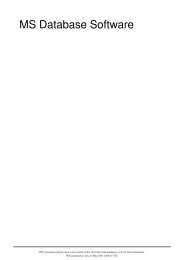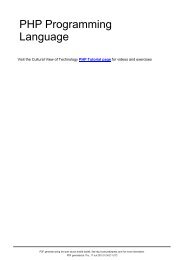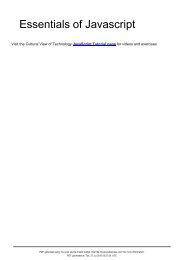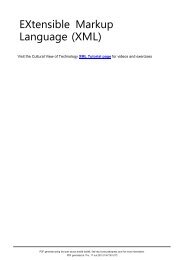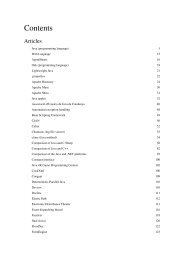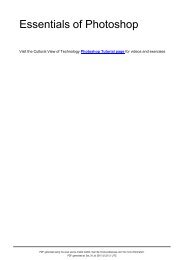Structured Query Language (SQL) - Cultural View of Technology
Structured Query Language (SQL) - Cultural View of Technology
Structured Query Language (SQL) - Cultural View of Technology
Create successful ePaper yourself
Turn your PDF publications into a flip-book with our unique Google optimized e-Paper software.
PL/<strong>SQL</strong> 81<br />
Similar languages<br />
PL/<strong>SQL</strong> functions analogously to the embedded procedural languages associated with other relational databases.<br />
Sybase ASE and Micros<strong>of</strong>t <strong>SQL</strong> Server have Transact-<strong>SQL</strong>, Postgre<strong>SQL</strong> has PL/pg<strong>SQL</strong> (which tries to emulate<br />
PL/<strong>SQL</strong> to an extent), and IBM DB2 includes <strong>SQL</strong> Procedural <strong>Language</strong>, [6] which conforms to the ISO <strong>SQL</strong>’s<br />
<strong>SQL</strong>/PSM standard.<br />
The designers <strong>of</strong> PL/<strong>SQL</strong> modelled its syntax on that <strong>of</strong> Ada. Both Ada and PL/<strong>SQL</strong> have Pascal as a common<br />
ancestor, and so PL/<strong>SQL</strong> also resembles Pascal in numerous aspects. The structure <strong>of</strong> a PL/<strong>SQL</strong> package closely<br />
resembles the basic Pascal program structure or a Borland Delphi unit. Programmers can define global data-types,<br />
constants and static variables, public and private, in a PL/<strong>SQL</strong> package.<br />
PL/<strong>SQL</strong> also allows for the definition <strong>of</strong> classes and instantiating these as objects in PL/<strong>SQL</strong> code. This resembles<br />
usages in object-oriented programming languages like Object Pascal, C++ and Java. PL/<strong>SQL</strong> refers to a class as an<br />
"Abstract Data Type" (ADT) or "User Defined Type" (UDT), and defines it as an Oracle <strong>SQL</strong> data-type as opposed<br />
to a PL/<strong>SQL</strong> user-defined type, allowing its use in both the Oracle <strong>SQL</strong> Engine and the Oracle PL/<strong>SQL</strong> engine. The<br />
constructor and methods <strong>of</strong> an Abstract Data Type are written in PL/<strong>SQL</strong>. The resulting Abstract Data Type can<br />
operate as an object class in PL/<strong>SQL</strong>. Such objects can also persist as column values in Oracle database tables.<br />
PL/<strong>SQL</strong> does not resemble Transact-<strong>SQL</strong>, despite superficial similarities. Porting code from one to the other usually<br />
involves non-trivial work, not only due to the differences in the feature sets <strong>of</strong> the two languages, but also due to the<br />
very significant differences in the way Oracle and <strong>SQL</strong> Server deal with concurrency and locking.<br />
The Fyracle project aims to enable the execution <strong>of</strong> PL/<strong>SQL</strong> code in the open-source Firebird database.<br />
The StepSqlite product is a PL/<strong>SQL</strong> compiler for the popular small database <strong>SQL</strong>ite.<br />
See also<br />
• Relational database management systems<br />
References<br />
[1] http://otndnld.oracle.co.jp/document/products/V16967_01/doc/timesten.1121/e13076/intro.htm<br />
[2] http://www.ibm.com/developerworks/data/library/techarticle/dm-0907oracleappsondb2/index.html<br />
[3] http://download.oracle.com/docs/cd/B19306_01/appdev.102/b14261/block_declaration.htm<br />
[4] "Literals" (http://download.oracle.com/docs/cd/B19306_01/server.102/b14200/sql_elements003.htm#sthref365). Oracle Database<br />
<strong>SQL</strong> Reference 10g Release 2 (10.2). Oracle. . Retrieved 2009-03-20.<br />
[5] http://download.oracle.com/docs/cd/B19306_01/appdev.102/b14261/controlstructures.htm#sthref921<br />
[6] <strong>SQL</strong> PL (http://publib.boulder.ibm.com/infocenter/db2help/index.jsp?topic=/com.ibm.db2.udb.doc/ad/c0011916.htm)<br />
• Feuerstein, Steven; with Bill Pribyl (2005). Oracle PL/<strong>SQL</strong> Programming (4th ed. ed.). O'Reilly & Associates.<br />
ISBN 0-596-00977-1.<br />
• Naudé, Frank (June 9, 2005). "Oracle PL/<strong>SQL</strong> FAQ rev 2.08" (http://www.orafaq.com/faqplsql.htm).<br />
External links<br />
• Oracle FAQ: PL/<strong>SQL</strong> (http://www.orafaq.com/wiki/PL/<strong>SQL</strong>_FAQ)<br />
• Oracle <strong>Technology</strong> Center (http://www.oracle.com/technology/tech/pl_sql/index.html)<br />
• Oracle Tahiti Search Engine (http://tahiti.oracle.com)<br />
• Morgan's Library (http://www.morganslibrary.org/library.html)



